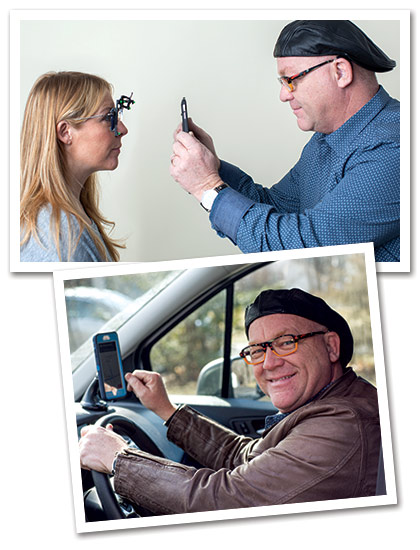
ROBERT DUNN knows this frustration firsthand. “There is a great deal of miscommunication between the Deaf and the hearing,” says the licensed optician. “Let’s face it. We live in a hearing world.” Dunn, who became deaf when he was 4 years old and communicates in ASL, has created a professional niche as a mobile optical health advocate for the Deaf community. Since its inception in April 2016, Dunn Rite Optical has been providing high quality frames and lenses to the Deaf and hard of hearing via its mobile lab. In fact, in just six months last year, Dunn logged 14,000 miles on the road, literally zigzagging across the northeast, from Massachusetts to Maine, going house-to-house fitting a growing network of patients who help him spread the word about the traveling deaf optician who makes house calls.
“I carry about 300 frames with me, including children’s styles and contact lenses,” says Dunn, who saw roughly 135 patients in 2016. “I used to carry everything in the trunk of my Volvo C70, but three weeks ago, I bought a new van and had it outfitted with frame shelves and a bench. I can park at a patient’s home, bring in my mirrors and cases, help them choose frames, and make any necessary minor adjustments in the van.” Dunn then crafts the lenses in his basement where he has a fully functional lab. His goal, he says, is to set up a wholesale lab that enables him to scan orders while still on the road and shorten the turnaround time for a complete pair of eyewear. He hopes to train deaf technicians to staff the lab.
Dunn, who graduated from the Rochester Institute of Technology with a major in Optical Finishing Technology, is ABO and NCLE certified and has over 30 years of experience in optical labs. And while he also sees a small number of hearing patients, he views himself as a bridge between the hearing and non-hearing world. “When you think about it, so many words in the English language have dual, or even multiple meanings,” he says. “And that doesn’t translate into sign language or lip reading which makes figuring out the meaning behind certain words all the more challenging. Factor in some of the confusing concepts centered around optical health, and it’s easy to see why so many deaf and hard of hearing patients need this kind of support.”
–Kristen Spina











